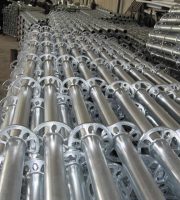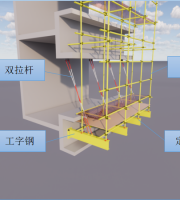The types of actual constructors include: (1) contractors of subcontracts; (2) contractors of illegal subcontracts; (3) units or individuals who lack corresponding qualifications and sign construction contracts with others in the name of qualified construction enterprises.
The second is: the behavior of the actual constructor who borrows the qualification to sign the construction project construction contract with the employer in the name of the construction enterprise that lends the qualification.
How should he realize the right relief and the corresponding claim basis? Distinguishing whether the contract letting party knows (or should know) about the borrowing of qualification by the actual constructor, 01 the claim basis of the contract letting party who knows the borrowing of qualification implies two legal acts for the case that the contract letting party knows that the actual constructor borrows the qualified construction enterprise to sign the construction contract with the contract letting party: one is: the act of the borrowing of qualification by the construction enterprise to sign the construction contract with the contract letting party.
Article source: Wu Ziqian, lawyer of Guangdong Jundao Law Firm, in the Interpretation of the Supreme People’s Court on the Application of Law in the Trial of Construction Contract Disputes (I) [Fa Shi [2020] No.
From the perspective of protecting the interests of the actual constructor, this judicial interpretation gives the actual constructor the right to claim the project related rights directly from the contractee who has no contractual relationship with him, which greatly breaks through the basic principle of contract relativity.
That is, a civil juristic act performed with a false declaration of intent.
The validity of hidden civil legal acts expressed with false intentions shall be handled in accordance with relevant laws.” The construction contract of construction projects signed between the lending construction enterprise and the employer does not have true intentions (both parties do not even have substantive contracting acts) It is invalid.
Therefore, according to Article 43 of Construction Construction Interpretation I, the actual constructors who can break through the principle of privity of contract and request the employer to bear the responsibility within the scope of unpaid project funds do not include the actual constructors in the borrowing qualification and multi-level subcontracting and illegal subcontracting relationships.
The following will discuss whether the actual constructor (affiliate) with borrowed qualification belongs to the actual constructor specified in Article 43 above? Can the affiliated person directly file a lawsuit against the Employer in accordance with Article 43 to claim the right of claim for payment of project funds? If not, how can the actual constructor who borrows the qualification realize the right relief? 1、 Can the actual constructor who borrows the qualification directly file a lawsuit against the Employer to claim the right to payment of project funds based on the provisions of Article 43 of Construction Interpretation I? The actual constructor refers to the unit or individual that does not have a direct or nominal contractual relationship with the employer, but actually completes the construction of the construction project, and illegally contracts the actual investment of funds, materials and labor.
Article 146 of the Civil Code stipulates that “civil legal acts performed by actors and counterparts with false intentions are invalid.
This interpretation only standardizes the relationship between subcontracting and illegal subcontracting, and does not stipulate that the actual constructor who borrows qualification and the actual constructor in the relationship between multi-level subcontracting and illegal subcontracting have the right to request the Employer to bear the responsibility within the scope of the unpaid project funds.
An unqualified actual constructor who borrows the name of a qualified construction enterprise to sign a construction contract with the employer is invalid because it violates the mandatory provisions of laws and administrative regulations..
2、 The actual constructor with borrowed qualification cannot claim the project payment directly from the Employer according to the provisions of Article 43.
This article is interpreted to protect the interests of migrant workers and other construction workers, break the principle of privity of contract, and allow the actual constructor to request the employer to assume responsibility within the scope of project payment.
In principle, the parties shall request their respective debtors to assume responsibility according to their respective legal relationship.
The application of this interpretation should be strictly controlled.
However, the actual constructor who borrows the qualification cannot directly claim the project payment from the Employer according to the provisions of Article 43, which does not mean that the actual constructor who borrows the qualification cannot request the Employer to pay the project price after performing the construction contract of the construction project, and the actual constructor still has the right to directly request the Employer to pay the construction project price according to the relevant provisions of the Civil Code under specific circumstances.
25] (hereinafter referred to as “Construction Interpretation I”), Article 43, Paragraph 2: Where the actual constructor claims rights with the employer as the defendant, The people’s court shall add the subcontractor or illegal subcontractor as the third party in the case, and after finding out the amount of the construction project price owed by the employer to the subcontractor or illegal subcontractor, it shall judge that the employer shall be responsible for the actual constructor within the scope of the construction project price owed.
That is, a civil juristic act that expresses a false intention to conceal.
According to the minutes of the 20th meeting of professional judges of the First Civil Adjudication Division of the Supreme People’s Court in 2021, whether the actual constructors specified in Article 43 of the Interpretation of the Supreme People’s Court on the Applicable Law in the Trial of Construction Contract Disputes (I) include the actual constructors in the borrowed qualifications, multi-layer subcontracting and illegal subcontracting relationships The provisions of Article 43 involve two legal relationships of three parties: one is the contractual relationship between the contract letting party and the contractor for construction projects; The second is the subcontracting or illegal subcontracting relationship between the contractor and the actual constructor.
According to the Civil Code, there are three requirements for a civil juristic act to be effective: first, the actor has the corresponding capacity for civil conduct; second, the expression of will is true; third, it does not violate the mandatory provisions of laws and administrative regulations, and does not violate public order and good customs.
That is to say, the actual constructor referred to in Article 43 does not include the actual constructor with borrowed qualification, and the affiliate shall not request the employer to bear the responsibility within the scope of the unpaid project funds in accordance with the provisions of Article 43 of the Construction Interpretation I, breaking the principle of contract relativity.




